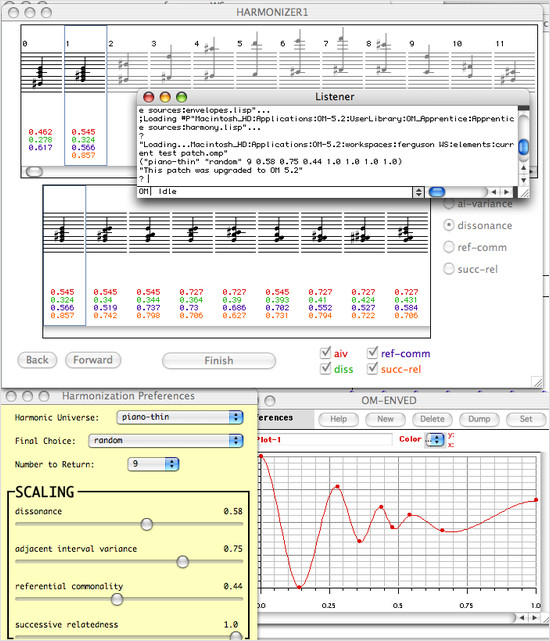
Screenshot of AgentCubes, a 3D version of AgentSheets, in MCL.
Alexander Repenning on info-mcl:
So, the good news is that we can do amazing things in Lisp and they even run very efficiently. The bad news is that at a time when Apple is doing really well and producing some pretty exciting hardware we have reached a new low in terms of Lisp development. Regarding MCL / OpenMCL we are all a bit frustrated here. We do not want to have to pick between Intel & SLIME versus PPC & real IDE. What is keeping MCL and OpenMCL from reuniting into a really useful version of Lisp for the Mac? At a technical level, what went wrong with MCL's compiler that it cannot produce code working at least with Rosetta? How com the LispWorks stuff works with Rosetta, can produce PPC, Intel and even Universal Binaries working on ALL Intel Macs? From a business point of view, why can Hazem not let go of a company that does no longer appear to be viable?
Clozure's Andrew Shalit responds:
There is no current collaborative relationship between Clozure and Digitool, beyond Clozure's hosting the mailing list.
[...]
We don't have plans to reunite them.
As for the future of OpenMCL:
We've recently been able to put more resources into OpenMCL development. The command-line (non-GUI) version of OpenMCL now runs on Linux, Free BSD and OS X, supporting PPC and 64-bit Intel processors. We hope to have a 32-bit Intel port at some point, but we don't have anything to announce about that today.
Gary Byers has written an Objective-C interface that allows you to write Cocoa applications for the Mac in OpenMCL. This is not as simple as the MCL carbon interface was, but that's mostly a result of the fact that Cocoa is a much more complete object-oriented framework, and we are providing complete access to it: you can add Lisp methods to Objective C objects, you can subclass across the languages, etc. For those who want something simpler, we are working on an example library that provides a quick-and-easy gui programming interface along the lines of what MCL offered.
We have used the Cocoa tools to create a GUI-based IDE for OpenMCL on the Mac. The IDE is approaching beta quality and we intend to keep putting resources into it as much as we can. It's not the same as the MCL IDE, but we think Macintosh people will be happy with it. It's a real Macintosh app. This currently runs on PPC Macs, and it will run on 64-bit Intel Macs as soon as Leopard is released. (Leopard is required to run Cocoa as a 64-bit process.)
Andrew then says they could use more testers for the new IDE and explains how to try it out, though the situation with OpenMCL and OS X is a little confusing—I don't think there's an OpenMCL 1.1 that runs in the currently released version of OS X (10.4) on Intel hardware, so I don't think I can easily try the IDE.
Update: To be clear, OpenMCL 1.1 apparently runs fine on Intel Macs, but the Cocoa IDE does not.
Sean Ferguson's desperate cry:
Posted by jjwiseman at October 01, 2007 05:01 PMIf there is anybody left at MCL any more to read this, please tell us if MCL is dead or not! This is killing me!
OpenMCL runs fine on Intel Macs. It is only available as a 64bit version on Intel Macs running Mac OS X. It does not have the IDE currently under 10.4 on Intel Macs.
Since almost no Apple libraries are 64bit in Mac OS X 10.4, OpenMCL on Intel Macs does not have an interface to Cocoa or other Apple libraries.
OpenMCL runs under the current Leopard pre-release versions, again on Intel machines only in 64bit mode. Since under Leopard most libraries exist in both 32bit and 64bit versions, OpenMCL supports under Leopard also the Intel Macs with its Cocoa-based IDE. There is a bit effort needed to get it running (remember, Leopard is not released), but it is possible.
Whew, I'm glad you're back. I thought the bees got you.
Posted by: Sean on October 11, 2007 01:24 AMOpenMCL runs just great under Intel Mac, but runs only as a 64-bit application. Since Cocoa is not available as a 64-bit framework in OS X (10.4 or prior), you can't get to the Cocoa layer.
If you have access to a Leopard Beta (e.g., from WWDC 2007), you can run the Cocoa applications quite easily. The recent screenshots of Alexander Repenning's stuff (the "Open Agent Engine") on my blog over the last couple of months are all from the Leopard beta running under OpenMCL 1.1 on Leopard.
